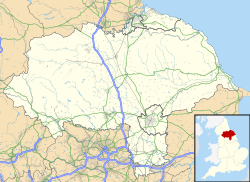| Cawthorne Camp | |
|---|---|
| North Yorkshire, England | |
Location in North Yorkshire | |
| Coordinates | 54°18′00″N 0°47′53″W / 54.300°N 0.798°W |
| Grid reference | SE783900 |

Cawthorne Camp (sometimes spelled "Cawthorn") is a Roman site in north-east England, about 4 miles (6 km) north of Pickering, North Yorkshire.[1] The well-preserved earthworks outline two forts, one with an extension, and a temporary camp built to an unusual plan.[2] The earthworks date from the late 1st/early 2nd century AD. It has been suggested that they were built for practice rather than for actual military use.[2]
Archaeological investigation has also found indications of pre-Roman activity at the site, and also traces of later sunken dwellings (Grubenhäuser).[3] A late Iron Age chariot burial was discovered at the site in 1905 by J. R. Mortimer and at least one other square barrow is known from the site.[4]
The site was acquired by the North York Moors National Park in 1983.[5]
References
- ^ "OL27" (Map). North York Moors - Eastern area. 1:25,000. Explorer. Ordnance Survey. 2016. ISBN 9780319242667.
- ^ a b Historic England. "Cawthorn Roman forts and camp including a section of medieval trackway known as the Portergate (1007988)". National Heritage List for England. Retrieved 14 January 2018.
- ^ Historic England. "Cawthorn (60589)". Research records (formerly PastScape). Retrieved 14 January 2018.
- ^ Stead, I. M. (1979). The Arras Culture. Yorkshire Museum. p. 99.
- ^ "Cawthorn Roman Camps: North York Moors National Park". northyorkmoors.org.uk. Retrieved 14 January 2018.
External links
- "Cawthorn Roman Camps" on Wikimapia

